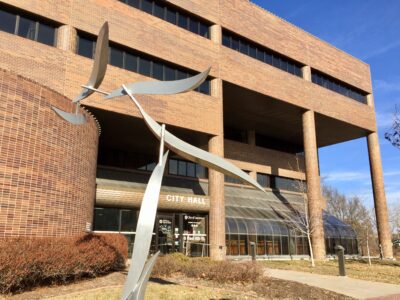Kansas Senate panel puts brakes on KU Central District project

This concept drawing from Kansas University's 2014-2024 Master Plan shows Innovation
Topeka ? A Senate committee voted Monday to put the brakes on Kansas University’s $350 million Central District project, at least until lawmakers get more information about the plans, a move that Democrats say could damage the credit ratings of both KU and the state of Kansas.
Sen. Tom Arpke, R-Salina, inserted language in a pending budget bill for the upcoming fiscal year that would prevent KU from making “any payments” related to that project. That would presumably include any lease payments KU intends to make to the nonprofit corporation that was set up to issue the bonds.
“If they want to expend endowment funds, they’re welcome to do that,” Arpke said. “If they want to go raise additional private funds, they’re more than welcome to do that. If they want to solicit me and ask for donations to help pay for this, they’re welcome to do that. I’ll probably say no.”

Sen. Tom Arpke, R-Salina, wants to put a halt to Kansas University's Central District project until lawmakers have a chance to have all their questions answered.
“I think we just need to call this for what it is, which is just a continuing attack on the flagship university,” said Sen. Laura Kelly, D-Topeka. “It doesn’t do our state any good. It harms our reputation and our ability to recruit and retain high-quality folks.”
According to KU’s plans, the nonprofit corporation, KU Campus Development Corporation, will be the owner of the new facilities and KU will lease them back, using tuition, fees and other revenues generated by the projects, and they have insisted that state taxpayers are not at risk of having to repay the bonds.
Lawmakers, however, have not been so easily convinced. At meetings before the Joint Committee on State Building Construction in November, and the interim Legislative Budget Committee the following month, members of both panels expressed concern that the state would eventually be on the hook if anything went wrong with the project, and they said the full Legislature would have further questions when the 2016 session began in January.
KU, however, went forward with the bond issue in early January, just days before the Legislature convened, using a Wisconsin public finance agency to execute the bond sale instead of the Kansas Development Finance Authority because KDFA is not empowered to issue bonds for any projects involving research facilities without legislative approval.
Arpke said he and other legislators who don’t serve on the interim committees have not been given any information about the projects.
“Why should we have to go seek it out?” he said. “I don’t take the Lawrence paper. I don’t take the Topeka paper. I don’t take the Salina paper. So unless they’re going to have something on the World Wide Web outlining the entire project, that’s not public dissemination of the project.”
Arpke said the limitation would apply to the use of any state funds, as well as tuition and fee funds, but would not apply to the use of any federal funds.
The House Appropriations Committee put somewhat different language in its budget bill last week. The House bill would put limits on how much KU could spend next year out of certain “unrestricted” funds such as tuition and fee funds.
KU officials are scheduled to appear Tuesday before the Senate Ways and Means Committee and may also appear before the House Appropriations Committee to discuss the project.
“We know that legislators have questions about the central district project and we look forward to answering them (Tuesday) at the meetings of the House Appropriations Committee and the Senate Ways and Means Committee,” KU Vice Chancellor Tim Caboni said in a statement released later Monday.
Sen. Marci Francisco, D-Lawrence, said she is concerned that interference by the Legislature could hurt the state’s bond rating.
“If the Legislature starts passing legislation that says you can’t make payments, how are we helping our bond rating?” Francisco said.
Arpke said his amendment could be removed from the bill at any time, but he wanted to send a message to KU about the Legislature’s displeasure.






